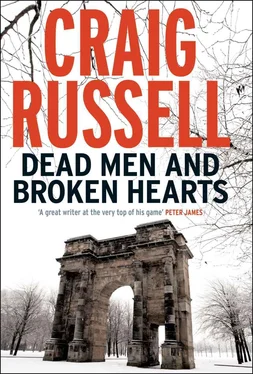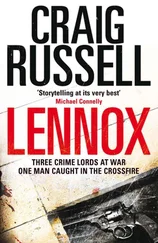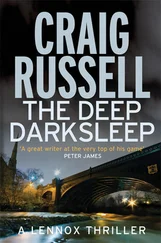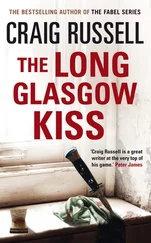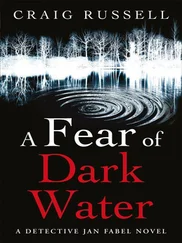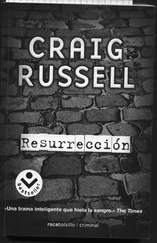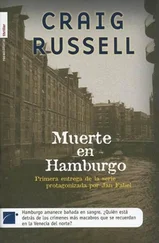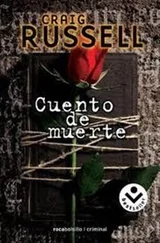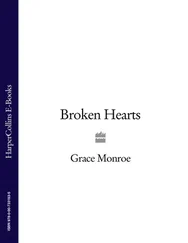Craig Russell - Dead men and broken hearts
Здесь есть возможность читать онлайн «Craig Russell - Dead men and broken hearts» весь текст электронной книги совершенно бесплатно (целиком полную версию без сокращений). В некоторых случаях можно слушать аудио, скачать через торрент в формате fb2 и присутствует краткое содержание. Жанр: Триллер, на английском языке. Описание произведения, (предисловие) а так же отзывы посетителей доступны на портале библиотеки ЛибКат.
- Название:Dead men and broken hearts
- Автор:
- Жанр:
- Год:неизвестен
- ISBN:нет данных
- Рейтинг книги:4 / 5. Голосов: 1
-
Избранное:Добавить в избранное
- Отзывы:
-
Ваша оценка:
- 80
- 1
- 2
- 3
- 4
- 5
Dead men and broken hearts: краткое содержание, описание и аннотация
Предлагаем к чтению аннотацию, описание, краткое содержание или предисловие (зависит от того, что написал сам автор книги «Dead men and broken hearts»). Если вы не нашли необходимую информацию о книге — напишите в комментариях, мы постараемся отыскать её.
Dead men and broken hearts — читать онлайн бесплатно полную книгу (весь текст) целиком
Ниже представлен текст книги, разбитый по страницам. Система сохранения места последней прочитанной страницы, позволяет с удобством читать онлайн бесплатно книгу «Dead men and broken hearts», без необходимости каждый раз заново искать на чём Вы остановились. Поставьте закладку, и сможете в любой момент перейти на страницу, на которой закончили чтение.
Интервал:
Закладка:
In that kind of smog, crossing the road becomes a job for all your senses. When taxis or buses have a habit of looming suddenly out of the murk, only feet away from you, you learn to listen out for the sound of approaching motor engines, hearing them long before you see a glimmer of headlights.
I was given my chance by the Whispering Death.
To be more precise, I was given my chance by the Number Thirteen Whispering Death to Clarkston. I acted on instinct more than anything else. My police escort was leading me across the street when the trolleybus, its electric motor silent, surged out of a wall of grey-green smog. On seeing us, the driver sounded his claxon and the police constable pulled me back towards the pavement.
It was more an instinctive reaction — the fly’s impulse to pull against the spider’s web — than a conscious decision to escape. I yanked my arm hard, pulling the copper with me into the path of the trolleybus. He shouted something obscene and let go of my sleeve and I threw myself in the other direction, placing the trolleybus between me and the uniform, Dunlop and Ferguson.
I could hear Ferguson shouting behind me but I lunged forward. I tripped up over my own feet, made larger and more cumbersome by the unlaced army boots, and came down hard onto the cobbles of the street. I picked myself up instantly and ran headlong toward the other side of the road.
And right into the path of a taxi.
Fortunately, the cab was travelling slowly because of the poor visibility and I suffered no injury other than the slurs on my mother’s virtue bawled out through the window by the driver. One of my boots had come off and I kicked the other one free and ran on in my sock soles. It made my feet slip on the cobbles, but when I made it to the opposite pavement, dodging in front of the parked police car, I got full purchase and was able to sprint. There were shouts and the sound of running behind me and the blast of a horn told me that one of my pursuers had also run out in front of a vehicle.
Running full pelt in the smog had a certain edge to it, like playing Russian roulette. With only a three- or four-yard visibility, there was the constant risk of a bone crunching collision with another pedestrian, a lamppost or an unpredicted wall. It also had its advantages: there could only be two of them after me, Jock Ferguson and the burly uniformed constable. I reckoned Shuggie Dunlop’s running range was even more limited than the visibility. They couldn’t see me now; I had become hidden behind a curtain of smog within a few yards, but unfortunately not before seeing the direction I took. That meant they wouldn’t have had to split up and each take a direction, and both Ferguson and the uniform would be heading this way. I thought about re-crossing the road and heading back the way I had come, but that was too obvious and there was always the chance that they were each taking one side of the street.
I took a random right into an alley and sprinted full pace, again hoping I didn’t tumble over an obstacle. I came to another alley, cutting across the first, so I took another right. Eventually I reached the gloomy, indistinct mouth of the alley and found myself in what I guessed was a bigger street, although it was difficult to tell in the smog-tightened pool of visibility. I took off again at random, eventually slowing to a trot, my stocking-soled feet silent on the pavement.
Peering into the smog around me, I occasionally picked out the sounds of footsteps and the indistinct bloom of hand-held flashlights. No one was looking for me here — the torches were those of pedestrians equipped for the smog, following a wall or a pavement edge to find their way. Ferguson, Dunlop and the uniformed policeman had no chance of finding me now and, if they had split up, I guessed they’d struggle to find each other, blind in the smog. But they weren’t the only ones who were lost. I had no idea where I was.
I found another alley way and dodged into it, moving the few feet back from the street necessary to be concealed from view. My feet were beginning to hurt, not so much because I’d been running on stone and asphalt without shoes but because of the cold that was beginning to penetrate deep into the bone. That was something I needed to sort out sooner rather than later. I leaned my back against some stonework and made a conscious effort to calm myself and think through my situation. Apart from the small inconvenience of being a wanted man on the run, dressed in a prison outfit, hunted by the police and without any kind of footwear, it was all going swimmingly.
CHAPTER THIRTY
Think, Lennox.
I kept repeating it to myself, trying to push back the panic. After all, I’d been in worse situations.
There had been some kind of cockeyed logic behind my escape. I wasn’t kidding myself that I could live the rest of my life as a fugitive, even if I did somehow get back to Canada, but I knew that my prospects were no more sunny if I had stayed put with the police. I had to find the answers myself, and I couldn’t do that from a cell. I even toyed with the idea that Ferguson had taken me to the Hopkins building, even though he already knew there was no one there, just to give me a chance to make a break for it. I dismissed the thought: no matter how sympathetic he was to my plight, Jock Ferguson was a straight-down-the-line copper. Creative thinking or expedient dodges were not in his makeup.
And I tried not to think about the little lecture Ferguson had given me about flight being an indicator of guilt.
I tried to look on the bright side: I may have looked grubby, dishevelled, black-eyed, unshaven, shoeless and probably half-mad, but I comforted myself with the thought that this was Glasgow, so there was no problem with me looking out of place.
There really were genuine advantages to my situation. The smog was a godsend: Ferguson wouldn’t call out search parties, knowing it would be a fool’s errand. I could bet, however, that every patrolling beat bobby would have my description the next time he made the routine call from his police box to check in with his station. It all meant that I had time, but not much. And, of course, the smog was as much an encumbrance to my escape as it was to their manhunt.
I had to get my bearings.
Glasgow’s artery was the Clyde. And, like all arteries, it had a pulse. There was always loud activity on the river or along its shores. If I could get to it, I could get some kind of bearing.
I strained the smog for the sounds of the river. Nothing. Just the bleating of car and bus horns as drivers warned each other of their snail’s pace approach in the smog. Guessing that the sounds of traffic would indicate the city centre, I took it as a bearing and headed in the opposite direction, again dodging the sounds of footsteps in the fog. I still managed to scare an older couple when I nearly bumped into them. The old man drew his wife to him as they both took in my appearance with startled, terrified eyes. I mumbled an apology and stumbled on, leaving them shocked and puzzling as to whether I would turn back into Dr Jekyll before midnight.
I reckoned I must have been heading toward the Trongate, but when I found myself following the flank of a massive, ornate building, and could hear the rhythmic sounds of chugging locomotives, I realized that I must have staggered across the street without recognizing any landmarks and was now at the back side of the St Enoch Station. Again I paused, resting against the wall and massaging my feet, one by one. This was good and bad: I was nearer the river but also closer to Buchanan Street. More people. And more coppers.
I pushed off again, heading into the maze of streets and alleys behind the station. A sign told me I was in Dunlop Street. Now I could clearly hear the horns and claxons of barges and tugs navigating the smog-bound water. If I handled this right, I might even find the suspension footbridge near Custom Quay and get over to the south side of the Clyde, where I could either get lost in the warren of the Gorbals or trace my way along the river.
Читать дальшеИнтервал:
Закладка:
Похожие книги на «Dead men and broken hearts»
Представляем Вашему вниманию похожие книги на «Dead men and broken hearts» списком для выбора. Мы отобрали схожую по названию и смыслу литературу в надежде предоставить читателям больше вариантов отыскать новые, интересные, ещё непрочитанные произведения.
Обсуждение, отзывы о книге «Dead men and broken hearts» и просто собственные мнения читателей. Оставьте ваши комментарии, напишите, что Вы думаете о произведении, его смысле или главных героях. Укажите что конкретно понравилось, а что нет, и почему Вы так считаете.
